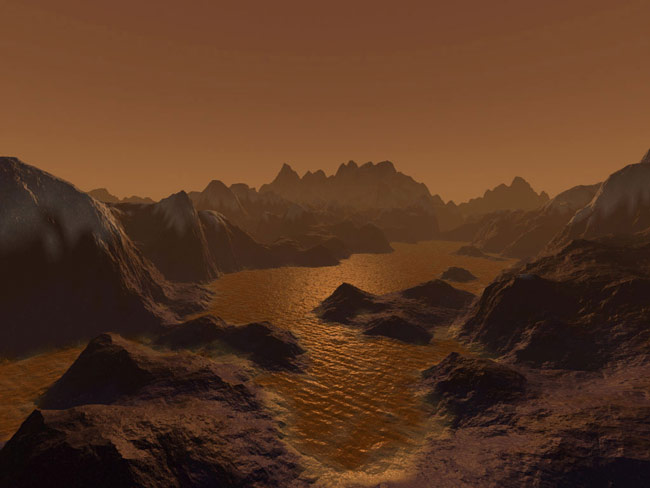Exotic Life Could Sprout From Titan Chemistry

If life exists on Titan, it's anyone's guess what that life looks like.
Saturn's largest moon is not a good candidate for Earth-like life because it usually lacks liquid water on the surface. But one of Titan's most promising features is the presence of lakes filled with liquid hydrocarbons, or molecules made of hydrogen and carbon, such as methane and ethane. These lakes were recently spotted by the Cassini-Huygens mission, a NASA/European Space Agency/Italian Space Agency spacecraft currently in orbit around Saturn. Titan is now the only body in our solar system other than Earth known to have liquid on its surface.
A new study has found that, depending on their particular make-up and volume, the lakes on Titan could be good hosts for a certain type of prebiotic-like chemistry that could lead to life. High-energy cosmic rays blast down on the lakes and could spark reactions that create more complex molecules.
"I found that the result is very dependent on the chemical composition of the lakes," says Tetsuya Tokano, a planetary scientist at the University of Cologne in Germany and author of a paper in the March 2009 issue of the journal Astrobiology detailing the study results. "If certain chemicals are missing, then the lake could freeze or dry out. But if the lake is composed of a mixture of ethane, methane and nitrogen, the lake can exist for many years and provide a medium for prebiotic-like chemistry."
Though Cassini RADAR images photographed a number of hydrocarbon lakes in the polar region of Titan, the spacecraft was unable to determine how deep the lakes are or what they're made of.
Based on what is known, Tokano used computer numerical models to analyze many possible sets of lake conditions to find which are most promising for prebiotic-like chemistry and possible development of alien life.
He found that the ability of Titan's lakes to harbor biochemistry depends not just on their composition, but on their size. If a lake is too shallow it might evaporate before any significant developments can take place. However, if a lake is too deep, it might have a bottom layer that doesn't mix well with upper layers, and important chemicals could be sequestered away.
Get the Space.com Newsletter
Breaking space news, the latest updates on rocket launches, skywatching events and more!
New Kinds of Alien Life
Much about Titan and the possibility of life there is still unknown. "If there is life on Titan it would be very different from that on Earth," Tokano says. "And we don't know if such life is possible at all. It's just speculation."
Titan may be a good candidate for silicon-based life, if it exists, because the moon has the low temperatures, lack of oxygen, and lack of liquid water thought to be necessary for this kind of life.
Silicon-based life would use the element silicon to build its cells, rather than carbon as life on Earth does. Because silicon is heavier than carbon and bonds differently with other elements, these types of cells would probably look and function differently than cells familiar to us. Instead of using water as a solvent, silicon-based life could use another substance. Some scientists have proposed that the hydrocarbon mixtures in Titan's lakes could act as a solvent for exotic forms of life.
Mysterious Moon
Many questions remain about Titan's lakes, including what they might look like up close. "Some are as big as [Michigan's] Great Lakes," Tokano says. "I don't know the exact color, but a deep lake would be darker than a shallow lake, and perhaps the color is not blue."
He and other scientists would love more data to help solve these riddles. They have been pushing for a dedicated spacecraft to visit Titan and send back data from the lakes. So far, no firm plans exist, although NASA and ESA are studying a possible mission concept. "I hope that there will be future probes, but this may take 20 or 30 years," Tokano says. "I would like to know the depth of the lakes, and the exact chemical composition. In principle, if we have a future mission to Titan, a probe which lands on the lake itself, it should be possible."
Studying the chemistry of Titan's lakes could be significant not just in the search for life beyond Earth, but also in the quest to learn about the origin life on our own planet, Tokano says. Learning whether certain conditions on other worlds are conducive to prebiotic chemistry could help narrow down the possibilities, or exclude conditions that clearly couldn't lead to the carbon-based life we have on Earth. "If you compare the conditions of Earth and Titan, we can maybe find the difference in the evolution of prebiotic chemistry, and discover which conditions are necessary," Tokano says.
Join our Space Forums to keep talking space on the latest missions, night sky and more! And if you have a news tip, correction or comment, let us know at: community@space.com.

Clara Moskowitz is a science and space writer who joined the Space.com team in 2008 and served as Assistant Managing Editor from 2011 to 2013. Clara has a bachelor's degree in astronomy and physics from Wesleyan University, and a graduate certificate in science writing from the University of California, Santa Cruz. She covers everything from astronomy to human spaceflight and once aced a NASTAR suborbital spaceflight training program for space missions. Clara is currently Associate Editor of Scientific American. To see her latest project is, follow Clara on Twitter.